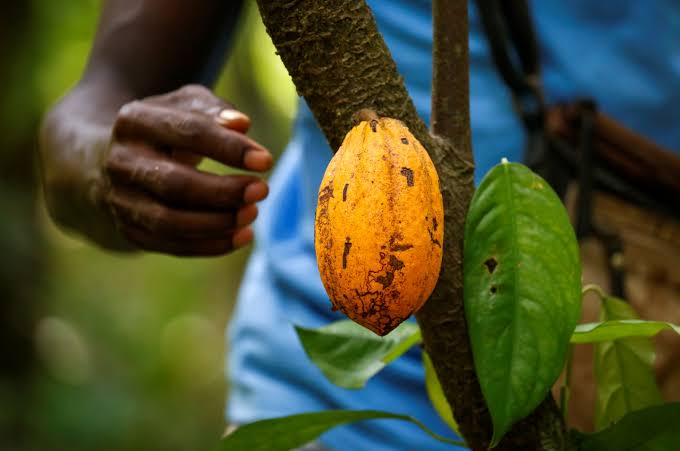News
World’s largest cocoa producer, Ivory Coast, worry over new US tariffs

Cocoa bean plantations guarantee the livelihoods of almost the entire village of N’gattakro in central Ivory Coast.
The “brown gold,” as cocoa is called in Ivory Coast, is crucial for survival in this village, with an estimated 6 million people relying on farming and harvesting cocoa for their livelihoods.
However, farmers worry that they might not be able to sell enough of their produce due to the looming effects of the 21% tariffs on Ivory Coast exports to the United States, imposed by US President Donald Trump in early April.
Salif Traoré, a cocoa farmer, explains, “The price isn’t good. If we hear the American president has put a tax on the price of cocoa, it’s really not good for us; it doesn’t help us.”
Cocoa is Ivory Coast’s main export to the United States.
- Like Traoré, many farmers are confused by the tariff news during an already difficult season due to unfavorable weather conditions.
“You see, this stockroom is full. Donald Trump’s customs tax is causing us problems. Because of this, people can’t buy our products. We’re already feeling the effects, so if there’s a solution to this problem, we’d be happy,” says Boss Diarra, cocoa farmers union coordinator.
Ahead of Ghana, Ivory Coast is the world’s largest cocoa producer.
Selling the precious beans makes up between 15% and 20% of the country’s GDP.
The situation also worries the government about the effects of Washington’s new trade policy.
“We are affected because about 4% of our trade takes place with the United States. This mainly concerns cocoa, rubber, and a little cashew,” says Amadou Coulibaly, government spokesperson.
On April 11, US President Donald Trump announced a 90-day pause on some tariffs, but a new universal 10% tariff will still apply.
“We must first try to see what new outlets we can find for our products to compensate for this loss,” Coulibaly continued.
While Ivory Coast could turn more extensively to European consumers, global demand for chocolate has stagnated in recent years.
Meanwhile, cocoa prices have repeatedly increased due to climate change, causing insufficient rainfall and a disappointing harvest last year.
Africa
JUST IN: Burkina Faso Bans Bill Gates-Backed GMO Malaria Project

Burkina Faso’s military government has halted a malaria eradication project backed by billionaire philanthropist Bill Gates and his foundation.
The project, run by the research consortium Target Malaria, focused on releasing genetically modified mosquitoes into the environment to help eradicate malaria.
On Friday, authorities ordered Target Malaria to immediately suspend all operations in the West African nation.
The move marks yet another clash between the government and international non-governmental organizations, many of which have faced intense restrictions under military rule.
The decision sparked heated reactions from civil society groups. Opponents of the project argue that Burkina Faso should focus on safer and more traditional solutions rather than experimenting with controversial genetic technologies.
A spokesperson for a coalition campaigning against the project stated that citizens “deserve protection through proven health measures, not risky experiments.”
Target Malaria, however, defended its work.
The group insisted that since 2012, it has complied with Burkina Faso’s national laws and worked closely with local authorities.
It expressed readiness to cooperate further with the government despite the sudden suspension.
The project has faced criticism not only within Burkina Faso but also internationally.
It became the target of online disinformation campaigns that claimed the genetically modified mosquitoes posed unforeseen dangers to the ecosystem.
While the first release of such mosquitoes took place in 2019, the long-term effects remain under global scientific debate.
Burkina Faso, one of the ten countries most affected by malaria, recorded more than eight million cases in 2024 alone.
The disease remains one of the leading causes of death in the country, particularly among children under five.
Supporters of the Target Malaria initiative argue that innovation is crucial to ending this deadly cycle, but critics fear it could introduce new risks.
This ban comes amid wider tensions between the military rulers and international organizations.
Since seizing power nearly three years ago, Captain Ibrahim Traoré’s administration has increasingly tightened control over foreign-funded NGOs.
In recent months, the government revoked the licenses of at least 21 groups, accusing some of pushing foreign agendas and destabilizing national sovereignty.
Analysts see the latest crackdown as part of a broader trend. Burkina Faso’s rulers are distancing the country from Western-backed projects while strengthening ties with alternative global partners.
However, the sudden halt to malaria research may come at a cost, as the country continues to battle one of the world’s deadliest diseases.
For now, the future of genetically modified mosquito projects in Burkina Faso remains uncertain.
The debate highlights the sharp divide between innovation and caution, science and politics, as the country balances urgent health needs with national sovereignty concerns
News
Paul Chukwuma joins peaceful march against Udogachi, SASA operatives in Anambra

The candidate of the Young Progressive Party (YPP) in the November Governorship election in Anambra State, Sir Paul Chukwuma, on Friday joined a peaceful march against the intimidation and abuse meted out to Ndi Anambra by operatives of Udogachi and SASA through misuse of governmental authority.
Udogachi, a security outfit created by the Soludo-led Government and the SASA, an anti-touting agency otherwise known as Ndi Akodo, which is notorious for using pestles on citizens, have come under intense scrutiny owing to the numerous clips of their abuses against the people.
In the past week, operatives of Udogachi have come under serious criticism for manhandling a young girl who is a serving youth corps member in Oba, Idemili South LGA of Anambra State.
During the peaceful march against the brutality of Udogachi and SASA, which was organized by Make Anambra Great Again, the YPP Governorship candidate regretted that the governor of Anambra State, Professor Charles Chukwuma Soludo, would allow agencies of the State established to serve the people to become instruments of operation against the same people.
“Anambra is not in a good place today. It affects all of us. We are determined to fix our state,” Paul Chukwuma said while addressing a large crowd at Eke Awka market.
The peaceful march, which commenced from Aroma Junction in Awka, terminated at the Anambra State Police Headquarters in Amawbia, where the group was received by the Deputy Commissioner of Police in charge of Operations, DCP Ibrahim Ezekiel.
At the Anambra State Police Command’s office, Sir Paul Chukwuma addressed the DCP and listed some of the reasons for the peaceful march, which include the abuse meted out to innocent citizens by Udogachi and SASA.
He also called on the police to rise up to their responsibilities, while assuring them of support from Ndi Anambra.
“The responsibility placed on the government in terms of protection of lives and properties is well spelt out in the constitution. In Anambra today, we are experiencing what is a negation of the position of the law. We know the agencies of government that are saddled with the responsibility of ensuring law and order in our state. Anambra State is still part of Nigeria as a sub-national entity. We are experiencing something that has never happened in the history of Anambra State…with what is happening today, we are beginning to wonder if the Nigerian Police Force has abdicated their responsibility and duty to Ndi Anambra. Today, we have experienced a litany of what we call an aberration to the protocol of such organization and agency (Udogachi and SASA). A lot of heinous crimes are being perpetrated in Anambra State by the so-called security outfit Udogachi. We don’t have anything against establishing such an outfit. But we are of the opinion that such outfits, when established, must abide by the rule of law,” Chukwuma said.
Reacting, DCP Ibrahim Ezekiel, who stood in for the Commissioner of Police, assured Paul Chukwuma and the group that the issues raised would be addressed by working with all stakeholders.
Speaking on behalf of the group, Nkem Mbonu, the group’s coordinator, said that the group had articulated three clear demands from their engagements with the people of Anambra State.
The demands include: an investigation into cases of missing persons in Anambra State. Secondly, an investigation into the alleged secret cells of Udogachi in Awka and Onitsha. Finally, the assumption of full security of the state by the police, as well as the disbandment of SASA.
The walk, which covered about seven kilometers, was well received by thousands of Anambra residents, who expressed their disapproval of the modus operandi of Udogachi and SASA operatives.
News
VIRAL VIDEO: Moment Yahaya Bello Orders Kogi State House Members to Sit on Floor, Gives Strict Directives

A viral video circulating on social media has captured former Kogi State Governor Yahaya Bello making newly elected State House of Assembly member, Hassan Shado, and his supporters sit on the floor during a meeting in Abuja.
The meeting took place at Bello’s residence on Monday, where he received members of the All Progressives Congress (APC) to discuss party unity and responsibilities.
Shado, who won the Dekina-Okura II State Constituency by-election on August 16, was formally presented to the former governor.
INEC declared Shado the winner after he polled 55,073 votes, defeating Godwin Meliga of the PDP, who garnered 1,038 votes.
During the session, Bello emphasized that Shado must strictly obey the directives of Governor Ahmed Usman Ododo in all legislative matters.
He drew his ear to stress the importance of cooperation, warning the lawmaker to align with Assembly decisions even when he did not fully understand them.
Bello said, “Go and cooperate with the Speaker and other members of the House of Assembly. Support Governor Ododo in everything that comes to the Assembly, even if you don’t understand it.”
Bello also reminded Shado that political victories are collective achievements.
He stated, “No candidate wins an election alone. Your people worked tirelessly from nomination to election day. Do not let them down.”
He urged inclusivity, consultation, and collective leadership, emphasizing that unity remains the key to APC’s continued success in Kogi State.
The former governor praised the people of Kogi East for demonstrating unity, which he said had been lacking in the past.
He further expressed confidence that APC would retain all major political positions in upcoming elections, declaring, “Our President, Bola Tinubu, will be re-elected.
Governor Ododo will be re-elected. All our candidates will continue to win on our great party’s platform.”
Bello’s post-governorship period has been marked by controversy.
The EFCC accused him of diverting over N110 billion from Kogi State coffers during his tenure.
He evaded multiple court summons and even a failed arrest in Abuja that led to a shootout. Ultimately, Bello surrendered to the EFCC on November 26, 2024, after months of avoiding legal proceedings.
Despite his legal troubles, Bello maintains influence over APC lawmakers in Kogi and continues to assert political authority, as shown in the recent video with Shado.
Watch the video below.
Africa
Why Every Nigerian Should Learn Combat Skills — CDS

The Chief of Defence Staff (CDS), General Christopher Musa, has urged all Nigerians to acquire combat skills such as Karate, Taekwondo, and Judo to protect themselves in the face of increasing danger.
Speaking on Channels Television’s Politics Today programme on Thursday, August 21, General Musa likened learning martial arts to other essential survival skills, including driving and swimming.
“That one should be taken as learning driving, learning how to swim.
Whether we have war or not, it is a survival instinct,” he said.
He added that in Europe, swimming and basic security education are compulsory because citizens must understand and practice personal safety.
The defence chief emphasised that the National Youth Service Corps (NYSC) should incorporate unarmed combat training into its programme to prepare graduates for real-world threats.
He explained, “That’s what the NYSC is supposed to do, but the NYSC has been watered down to three weeks. Self-defence is very important.
Unarmed combat, swimming, driving these are critical aspects of human survival. We should never take them for granted because they prepare us for the future.”
General Musa further encouraged Nigerians to remain situationally aware of their environment, alerting authorities to any suspicious activities or individuals.
He said, “The world we are in now is dangerous. We have individuals who don’t mean people well. They kill for whatever reason.”
Highlighting evolving threats, General Musa disclosed that terrorists increasingly use gold to finance their operations.
He noted that complex international networks make it difficult to immediately expose or prosecute these financiers. “Gold is the main source.
They circulate it through various channels, including foreign links, which complicates intervention,” he explained.
General Musa acknowledged that bad roads and challenging terrains hinder rapid military response to attacks.
He said, “Many Nigerians expect immediate intervention from the Armed Forces without understanding the logistical challenges. By the time information reaches us, terrorists have already struck and vanished because they move more quickly in these regions.”
He added that improvised explosive devices (IEDs) in the North-East further slow troop movement.
Regarding the Southeast, General Musa noted that the arrest of pro-Biafran agitator Simon Ekpa in Finland in November 2024 has improved security in the region.
He said, “Troops are actively pursuing Ekpa’s lieutenants in Imo, Enugu, Anambra, Ebonyi, and Abia states. We will continue operations until all threats are neutralised.”
The CDS also praised the synergy among the Nigerian Army, Air Force, and Navy, which led to the arrest of Ansaru terrorist leaders, describing it as a major success in the fight against terrorism.
General Musa concluded by announcing an African Chiefs of Defence Staff conference to foster continental collaboration and enhance regional security efforts.
Health
Police Arrest Fake Doctor as Woman Dies During Abortion

Detectives from the Akwa Ibom State Police Command have arrested a man posing as a medical doctor following the death of a 35-year-old woman, Blessing Sunday Etim, during an alleged illegal abortion.
The suspect, identified as Sunday Okon Akpan, reportedly owns and operates the Full Life Medical Centre (FLMC) in Ikot Obio Odongo, Ibesikpo Asutan Local Government Area.
Deputy Superintendent of Police (DSP) Timfon John, the spokesperson for the Akwa Ibom Police Command, revealed that police launched a search for the victim after receiving a distress call from her mother.
DSP John stated that operatives acted quickly following the report, which indicated that Blessing had gone to work at the FLMC and never returned.
According to police reports, the suspect attempted to secretly dispose of the victim’s body in her room.
A co-tenant, who witnessed the act, raised an alarm, forcing the suspect to abandon the corpse and flee the scene.
Police quickly arrived at the scene, where detectives discovered a premature foetus, confirming the occurrence of an illegal abortion.
Police traced and arrested Sunday Okon Akpan, a resident of Afaha Offiong village, Nsit Ibom LGA.
Preliminary investigations indicate that the suspect is not a licensed medical doctor or nurse but a community health practitioner who allegedly used his clinic to perform illegal medical procedures, including abortions.
The health centre has since been found abandoned.
DSP John confirmed that the victim’s body has been deposited at a morgue for preservation and autopsy, while investigations continue to uncover more details surrounding the incident.
She also promised to update the public as the probe progresses.
This shocking incident highlights the dangers of unlicensed medical practitioners operating clinics and offering illegal procedures.
Police authorities are warning residents to verify the credentials of anyone offering medical services and to report suspicious activities to prevent similar tragedies.
As the investigation unfolds, Akwa Ibom police have vowed to ensure that justice is served, and the public remains safe from unqualified medical practitioners operating in the state.
-

 Featured5 days ago
Featured5 days agoYour Attacks on Peter Obi Are Petty, Stop It! Chekwas Rebukes Soludo
-

 News4 days ago
News4 days agoTension in Anambra community as senior police officer shoots kinsman dead
Colleagues, others try cover-up; victim's family fights back
-

 News7 days ago
News7 days agoAnambra South Bye-Election: APC Chief Rescues Deputy Gov Caught In Vote Buying From Angry Youths
By Chuks Collins, Awka
-

 Celebrity/Entertainment1 day ago
Celebrity/Entertainment1 day agoHow Nigerian TikToker Geh Geh Made ₦45 Million in One Night
-

 News5 days ago
News5 days agoNigerian visa applicants must provide 5-yr social media history — US embassy
-

 Analysis6 days ago
Analysis6 days agoSystemic Sabotage: How APC, INEC Colluded To Undermine Amamgbo’s Senatorial Bid
By Arthur Ezechukwu
-

 News3 days ago
News3 days agoTerrorist Organisation: APC, PDP Members in US, UK, France Risk Deportation
-

 Celebrity/Entertainment5 days ago
Celebrity/Entertainment5 days agoWhy single mothers can’t raise boys into proper men — Jim Iyke
-

 News7 days ago
News7 days agoBREAKING: Troops arrest Nigeria’s most wanted terror kingpin
-

 News2 days ago
News2 days agoVandal electrocuted while vandalizing Aba power infrastructure








